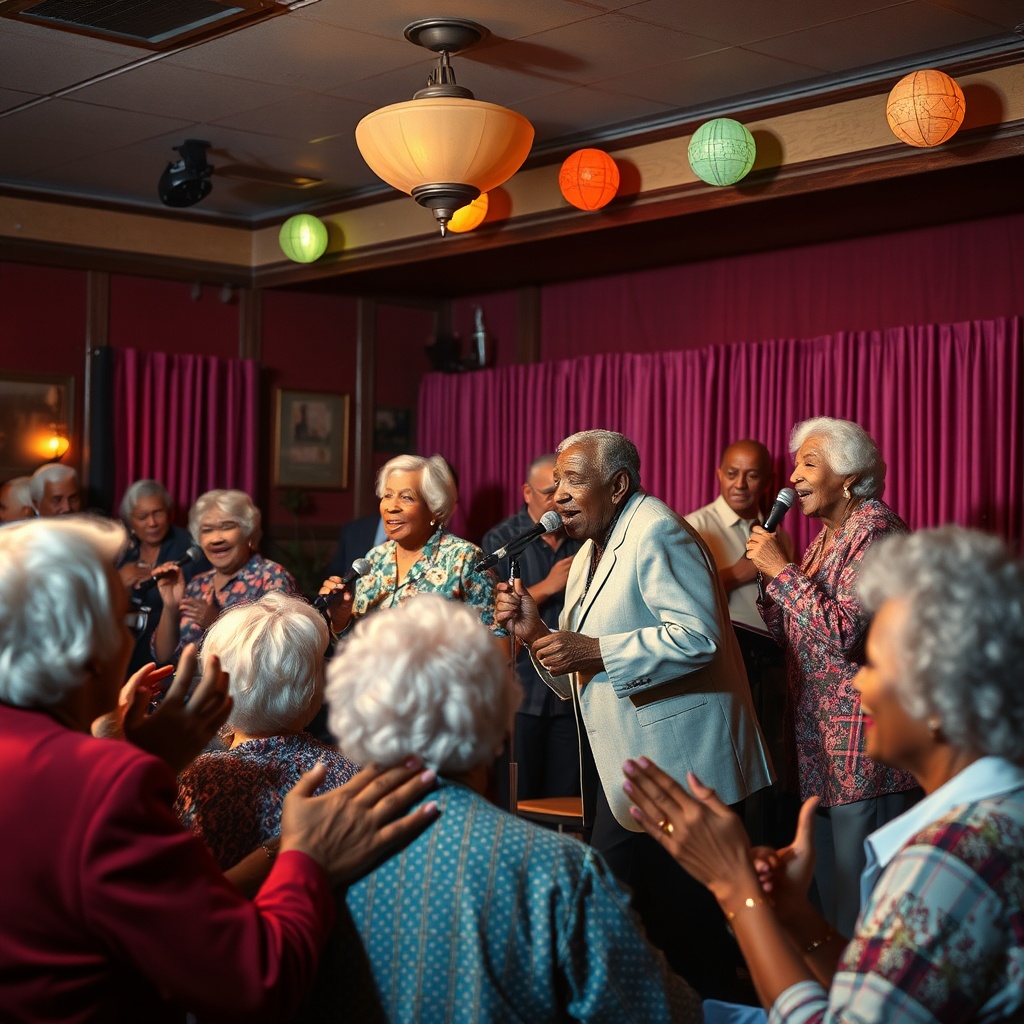Echoes of the Past: A Journey Through the Melodies That Shaped a Generation

As we take a moment to reflect on the powerful voices that emerged in the 1960s, we find ourselves immersed in the rich tapestry of music that defined a generation. These iconic singers not only provided a soundtrack to the civil rights movement but also echoed the struggles and triumphs of their communities.
The Soundtrack of Change
Consider how the melodies of the time carried messages of hope, resilience, and the pursuit of equality. Artists like Aretha Franklin, James Brown, and Marvin Gaye became the voices of a movement, their songs resonating deeply with the experiences of African Americans.
Key Artists and Their Impact
| Artist | Signature Song | Impact |
|---|---|---|
| Aretha Franklin | Respect | Empowerment anthem for women and the civil rights movement. |
| James Brown | I Got You (I Feel Good) | Symbol of black pride and resilience. |
| Marvin Gaye | What’s Going On | Addressed social issues and called for peace. |
Listening Experience
Imagine yourself in a living room filled with the soulful sounds of the 60s. Close your eyes and let the music transport you:
- Feel the power of Aretha’s voice: Her rendition of “Respect” ignites a fire within, demanding acknowledgment and dignity.
- Move to the rhythm of James Brown: His energetic performances inspire you to dance and rejoice in your identity.
- Contemplate with Marvin Gaye: His poignant lyrics encourage reflection on societal challenges and the need for unity.
Interactive Reflection
Now, take a moment to share your thoughts. What memories do these songs evoke for you? Perhaps a family gathering, a protest, or a dance party? Music has a unique way of binding us to our past.
The Legacy Lives On
The legends of the 1960s have paved the way for future generations. Their influence can still be felt in today’s music, as artists continue to draw inspiration from their powerful messages.
As we reflect on the echoes of the past, let us celebrate the resilience and creativity of these legendary singers. Their melodies have shaped not only a generation but also the very fabric of American culture.
Soulful Stories: The Untold Narratives Behind Iconic 1960s Hits

The Power of Music in the 1960s
In a time marked by social upheaval and change, the music of the 1960s served not only as entertainment but also as a powerful voice for change. It was an era when Black singers emerged as iconic figures, using their art to tell stories that resonated with the struggles and aspirations of a generation.
Unveiling the Stories
Have you ever wondered about the stories behind those unforgettable hits? Each song carried the weight of experience, pain, and hope. Let’s explore some of these untold narratives that shaped the sound of a decade.
Aretha Franklin: The Queen of Soul
When you hear Aretha’s voice, do you feel the passion that drove her? Her rendition of “Respect” wasn’t just a song; it was a declaration of dignity. It emerged during a time when civil rights were at the forefront of American life. Aretha transformed Otis Redding’s original into an anthem that demanded respect not just for women, but for all marginalized voices.
Marvin Gaye: The Prince of Motown
Marvin Gaye’s “What’s Going On” was born from his deep concern for the world around him. Do you remember how this song made you feel? It was a soulful plea for peace amidst the chaos of the Vietnam War and civil unrest. Marvin poured his heart into the lyrics, reflecting the confusion and desire for understanding that many felt during this tumultuous time.
Sam Cooke: A Voice for Change
With his smooth, soothing tones, Sam Cooke’s “A Change is Gonna Come” became a poignant symbol of the civil rights movement. Can you recall the first time you heard it? The song was inspired by Cooke’s own experiences with racism and his determination to see a brighter future. It’s a heartfelt message of hope that resonates even today.
Otis Redding: The Raw Emotion
Otis Redding’s “Sittin’ On The Dock of the Bay” captures a moment of reflection. Have you ever sat by the water, contemplating life? This song was born from Redding’s own feelings of uncertainty and longing for peace. Its simplicity and raw emotion remind us of the beauty in vulnerability.
Conclusion: The Legacy Continues
The stories behind these songs remind us that music is more than just notes and rhythms; it is a powerful medium for sharing experiences. As we reflect on the soulful legends of the 1960s, let us celebrate the resilience and creativity that continue to inspire generations. What songs from this era resonate with you, and what stories do they tell?
Legends in Harmony: Celebrating the Voices that Inspired Movements

Introduction to a Melodic Era
In the 1960s, music was more than just a form of entertainment; it was a powerful vehicle for change. The soulful legends of this era used their voices to echo the struggles and aspirations of a generation. Their songs became anthems of resilience, uniting people and inspiring movements. Let’s take a moment to celebrate these remarkable artists whose harmonies still resonate today.
The Power of Music in Social Movements
Music has the uncanny ability to transcend barriers. It connects individuals from different backgrounds and experiences. In the 1960s, songs like “A Change Is Gonna Come” by Sam Cooke and “Strange Fruit” by Billie Holiday were not just melodies; they were calls to action. They ignited passion and hope, encouraging people to fight for equality and justice.
Legends Who Shaped the Soundtrack of Change
Aretha Franklin—the Queen of Soul—captured the essence of resilience with her powerful voice. Her hit song “Respect” became a rallying cry for the civil rights movement, demanding dignity and equality for African Americans. Can you feel the strength in her voice?
James Brown, often referred to as the Godfather of Soul, brought a dynamic energy to his performances. His song “Say It Loud – I’m Black and I’m Proud” was a bold declaration of pride in one’s identity. His music encouraged many to embrace their heritage and stand tall.
As we remember these icons, think about your favorite songs from the 1960s. How did they make you feel? Did they inspire you? Many of us have personal stories tied to these legendary voices. Share your memories with friends and family, and let the music bring you together.
Legacy of the 1960s Singers
The impact of these singers extends beyond their music. They broke barriers, opened doors for future generations, and paved the way for artists today. Their messages of hope and strength remain relevant, reminding us that the fight for equality and justice continues.
Conclusion: Keeping the Music Alive
As we celebrate these legends, let us keep their music alive. Turn up the volume, sing along, and reflect on the powerful messages they shared. Their voices are not just echoes of the past; they are a source of inspiration for the present and future.
Rhythms of Resistance: How 1960s Black Singers Changed the Soundtrack of Freedom
In the turbulent 1960s, a time marked by civil rights movements and social upheaval, music emerged as a powerful tool for change. Black singers of this era not only entertained but also uplifted voices crying out for justice and equality. Let’s explore how these legendary artists transformed the musical landscape and became symbols of resilience.
The Birth of a Movement
As you reflect on this pivotal decade, consider how the music you loved served as a backdrop for the struggles and triumphs of the civil rights movement. Artists like Aretha Franklin, James Brown, and Nina Simone infused their songs with messages of hope and resistance.
- Aretha Franklin: Known as the ‘Queen of Soul’, her rendition of “Respect” became an anthem for both the feminist movement and the civil rights struggle.
- James Brown: With his hit “Say It Loud – I’m Black and I’m Proud”, he provided a bold declaration of racial pride that resonated deeply with African Americans.
- Nina Simone: A classically trained pianist, her song “Mississippi Goddam” captured the anger and frustration over racial injustices.
Music as a Form of Protest
Imagine a world where music speaks louder than words. The 1960s Black singers showed that music could be a form of protest, a way to raise awareness and inspire action. Their lyrics often reflected the realities of segregation, oppression, and the quest for equality.
- Motown Sound: This genre, characterized by its catchy melodies and rhythms, helped bridge racial divides and brought Black culture into mainstream America.
- Folk and Blues Influence: Artists like Odetta and Bob Dylan collaborated with Black musicians, highlighting the struggles faced by African Americans through their poignant lyrics.
Legacy of Empowerment
The impact of these artists extends beyond their music. Their courage to speak out against injustice paved the way for future generations of singers and activists. As you listen to their timeless songs, think about the messages they conveyed and the change they inspired.
- Empowering Future Artists: Today’s artists, such as Beyoncé and Kendrick Lamar, continue to draw inspiration from the legends of the 1960s, ensuring that the legacy of resistance and resilience lives on.
- Cultural Impact: Music festivals and events celebrating the contributions of Black artists have become commonplace, honoring the sacrifices made during the civil rights movement.
As you reminisce about the music of the 1960s, remember how these soulful legends not only created unforgettable tunes but also changed the soundtrack of freedom. Their rhythms of resistance continue to inspire and empower, reminding us of the strength found in unity and the power of the human spirit.
Melodic Memories: Reliving the Impact of Soul Music on Civil Rights
As we delve into the rich tapestry of the 1960s, soul music emerges not just as a genre but as a powerful force that intertwined with the very fabric of the Civil Rights Movement. Each note played and every lyric sung resonated deeply with a community yearning for justice and equality. Let’s take a moment to reflect on those melodic memories that shaped a generation.
The Birth of Soul Music
Soul music originated from a blend of gospel, rhythm and blues, and jazz. It served as a voice for the marginalized, echoing their struggles and triumphs. Artists like Aretha Franklin, James Brown, and Sam Cooke became the torchbearers of this genre, merging music with activism.
The Role of Soul Music in the Civil Rights Movement
During the 1960s, soul music became a soundtrack of the Civil Rights Movement. Songs like “A Change is Gonna Come” by Sam Cooke captured the essence of hope and determination. Let’s explore some key songs that made an impact:
| Song Title | Artist | Impact |
|---|---|---|
| A Change is Gonna Come | Sam Cooke | Anthem of the Civil Rights Movement |
| Respect | Aretha Franklin | Empowerment and Gender Equality |
| Say It Loud – I’m Black and I’m Proud | James Brown | Celebration of Black Identity |
Connecting Through Music
For many, listening to these songs was an act of resistance and unity. The soulful rhythms brought together people from all walks of life, inspiring them to stand up against injustice. Can you recall a specific song that moved you during that time?
Legacy of Soul Music
The legacy of 1960s soul music extends beyond its era. It laid the groundwork for future genres and movements, influencing artists today who continue to draw from its rich history. Remember how artists like Stevie Wonder and Marvin Gaye carried the torch forward?
Let’s take a moment to reflect. What memories do you associate with soul music? Did a specific song inspire you to take action or change your perspective? Share your thoughts, and let’s celebrate the enduring impact of these soulful legends together.
As we relive the impact of soul music on the Civil Rights Movement, let’s honor the voices that brought us together. Their melodies continue to resonate, reminding us of the resilience and strength found in unity.
